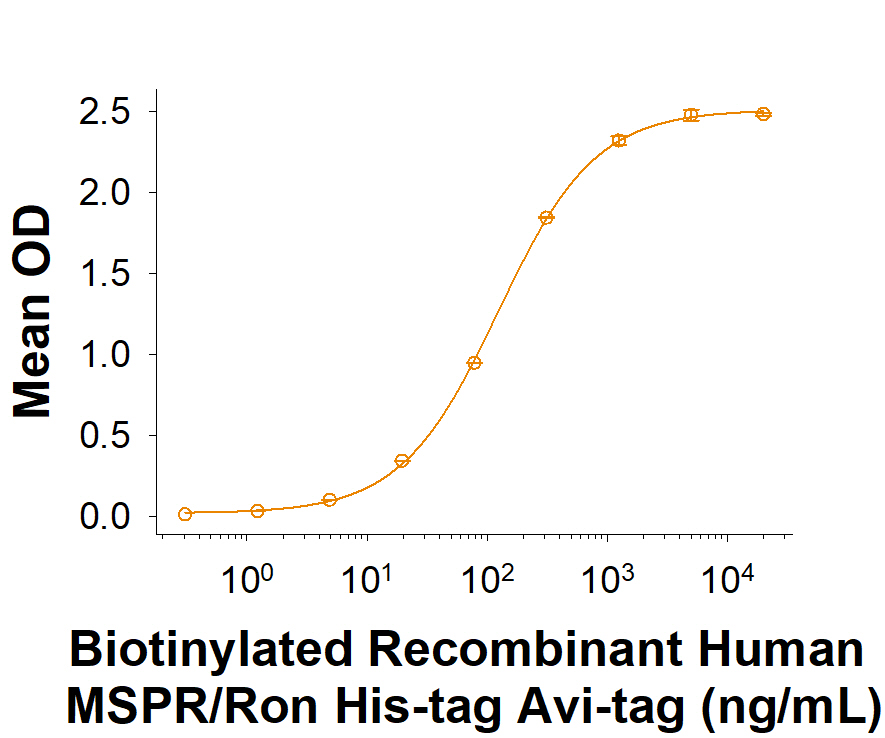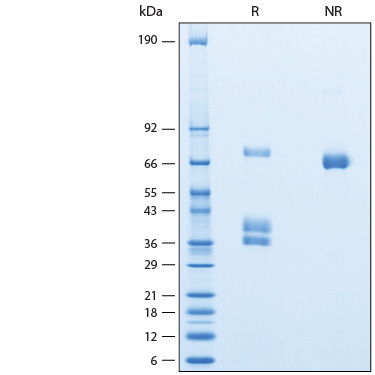Recombinant Human MSPR/Ron His-tag Avi-tag Protein, CF
Recombinant Human MSPR/Ron His-tag Avi-tag Protein, CF Summary
Learn more about Avi-tag Biotinylated ProteinsProduct Specifications
| Human MSPR/Ron (Glu25-Leu571) Accession # CAA49634.1 | HHHHHH | Avi-tag |
| N-terminus | C-terminus | |
Analysis
Product Datasheets
Carrier Free
CF stands for Carrier Free (CF). We typically add Bovine Serum Albumin (BSA) as a carrier protein to our recombinant proteins. Adding a carrier protein enhances protein stability, increases shelf-life, and allows the recombinant protein to be stored at a more dilute concentration. The carrier free version does not contain BSA.
In general, we advise purchasing the recombinant protein with BSA for use in cell or tissue culture, or as an ELISA standard. In contrast, the carrier free protein is recommended for applications, in which the presence of BSA could interfere.
AVI1947
| Formulation | Lyophilized from a 0.2 μm filtered solution in PBS with Trehalose. |
| Reconstitution | Reconstitute at 200 μg/mL in PBS. |
| Shipping | The product is shipped at ambient temperature. Upon receipt, store it immediately at the temperature recommended below. |
| Stability & Storage: | Use a manual defrost freezer and avoid repeated freeze-thaw cycles.
|
Scientific Data
 View Larger
View Larger
When Recombinant Human MSP/MST1 (Cys672Ala) Protein (Catalog # 4306-MS) is immobilized at 0.5 µg/mL, 100 µL/well, the concentration of Biotinylated Recombinant Human MSPR/Ron His-tag Avi-tag that produces 50% of the optimal binding response is approximately 40-240 ng/mL.
 View Larger
View Larger
2 μg/lane of Recombinant Human MSPR/Ron His-tag Avi-tag Protein (Catalog # AVI1947) was resolved with SDS-PAGE under reducing (R) and non-reducing (NR) conditions and visualized by Coomassie® Blue staining, showing bands at 34-42 and 64-78 kDa.
Reconstitution Calculator
Background: MSPR/Ron
Macrophage stimulating protein receptor (MSPR), encoded by the human Ron and the mouse Stk, is one of a small family of receptor tyrosine kinases (RTKs) that also includes human Met (the receptor for hepatocyte growth factor) and chicken Sea (1, 2). This family of receptors is synthesized as a single-chain precursors that are cleaved into a mature disulfide-linked heterodimers composed of an extracellular alpha chain and a membrane spanning beta chain with intrinsic tyrosine kinase activity. Biologically active ligands (MSP and HGF) for this family of receptors are also disulfide-linked alpha -beta heterodimers. Human MSPR cDNA encodes a 1400 amino acid (aa) residue precursor protein with a 24 aa signal peptide, a 285 aa residue alpha chain (Glu25-Arg309) and a 1091 aa residue transmembrane beta chain (Gly310-Thr1400). The extracellular domain of MSPR is comprised of an N-terminal sema domain, a PSI (plexin semaphorins integrins) domain, followed by four immunoglobulin-like folds shared by plexins and transcription factors (3). The soluble sema domain binds MSP and inhibits the MSPR-dependent signaling pathways. MSP receptor is expressed in multiple tissues including specific areas of the central and peripheral nervous systems, epithelial cells along the digestive tract, skin and lung, and in subpopulations of the mononuclear phagocyte lineage (1, 2). Although free MSP alpha or beta chains have been shown to bind MSPR, only the heterodimeric MSP can induce receptor activation and cause biological activity (4, 5). MSPR associates with other transmembrane molecules including integrins, cadherins and other cytokine receptors. Transactivation and signaling crosstalk between MSPR and its associated transmembrane receptors have been demonstrated (6-8). Human MSPR shares 72% amino acid sequence identity with mouse MSPR.
- Gaudino, G. et al. (1994) EMBO J. 13:3524.
- Wang, M-H. et al. (1994) Science 266:117.
- Angelonis, D. et al. (2004) J. Biol. Chem. 279:3726.
- Wang, M-H. et al. (1997) J. Biol. Chem. 272:16999.
- Danilkovitch, A. et al. (1999) J. Biol. Chem. 274:29937.
- Danilkovitch-Miagkova, A. et al. (2000) J. Biol. Chem. 275:14783.
- Danilkovitch-Miagkova, A. and A. Leonard (2001) Histol. Histopathol. 16:623.
- Santora, M. et al. (2003) Devel. Cell 2:257.
FAQs
No product specific FAQs exist for this product, however you may
View all Proteins and Enzyme FAQsReviews for Recombinant Human MSPR/Ron His-tag Avi-tag Protein, CF
There are currently no reviews for this product. Be the first to review Recombinant Human MSPR/Ron His-tag Avi-tag Protein, CF and earn rewards!
Have you used Recombinant Human MSPR/Ron His-tag Avi-tag Protein, CF?
Submit a review and receive an Amazon gift card.
$25/€18/£15/$25CAN/¥75 Yuan/¥1250 Yen for a review with an image
$10/€7/£6/$10 CAD/¥70 Yuan/¥1110 Yen for a review without an image
